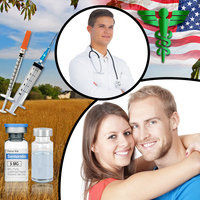Introduction
Premature ejaculation (PE) is a prevalent sexual dysfunction affecting a significant portion of the male population, often leading to psychological distress and relationship problems. While various factors contribute to PE, recent research has begun to explore the impact of psychological stressors on its prevalence and severity. This article delves into a prospective cohort study that followed 300 American males over three years, aiming to elucidate the relationship between stress and premature ejaculation.
Study Design and Methodology
The study involved a cohort of 300 American males aged between 25 and 50 years, who reported experiencing PE. Participants were assessed at baseline and followed annually for three years. Data collection included self-reported measures of PE, validated stress scales, and clinical interviews. The primary objective was to determine whether changes in stress levels correlated with changes in the severity and frequency of PE episodes.
Findings on Stress and Premature Ejaculation
The results of the study were compelling. At the outset, 78% of participants reported high levels of stress, which was associated with more severe PE symptoms. Over the three-year period, fluctuations in stress levels were closely mirrored by changes in PE severity. Specifically, a 10% increase in stress scores was associated with a 7% increase in the frequency of PE episodes. Conversely, participants who reported a decrease in stress levels also experienced a reduction in PE symptoms, suggesting a direct link between the two.
Psychological Mechanisms Underlying the Stress-PE Connection
Several psychological mechanisms may explain the observed correlation between stress and PE. Chronic stress can lead to heightened anxiety, which is known to exacerbate sexual performance anxiety—a common precursor to PE. Additionally, stress may disrupt the neuroendocrine system, affecting serotonin levels, which play a crucial role in ejaculatory control. The study highlighted that interventions aimed at reducing stress could potentially alleviate PE symptoms, underscoring the importance of addressing psychological factors in treatment plans.
Clinical Implications and Treatment Strategies
The findings of this study have significant clinical implications. Healthcare providers should consider incorporating stress management techniques into the treatment regimens for patients suffering from PE. Cognitive-behavioral therapy (CBT), mindfulness-based stress reduction, and relaxation techniques were identified as effective strategies for managing stress and, consequently, improving PE symptoms. Furthermore, the study advocates for a holistic approach to treating PE, one that addresses both the physiological and psychological aspects of the condition.
Limitations and Future Research Directions
While the study provides valuable insights into the stress-PE relationship, it is not without limitations. The reliance on self-reported data may introduce bias, and the sample size, although adequate, limits the generalizability of the findings. Future research should aim to include larger, more diverse cohorts and employ objective measures of stress and PE. Additionally, longitudinal studies that explore the long-term effects of stress management on PE outcomes would be beneficial.
Conclusion
This three-year prospective cohort study has shed light on the intricate relationship between stress and premature ejaculation among American males. The findings underscore the importance of addressing psychological stressors in the management of PE, suggesting that effective stress reduction strategies could lead to significant improvements in sexual health and overall well-being. As the field continues to evolve, further research will be crucial in refining treatment approaches and enhancing the quality of life for those affected by this common sexual dysfunction.
Contact Us For A Fast And Professional Response

- Mastering the Clock: Hormonal Influences on Ejaculatory Control and Addressing Premature Ejaculation [Last Updated On: February 17th, 2025] [Originally Added On: February 17th, 2025]
- Navigating the Speed of Intimacy: A Comprehensive Guide to Premature Ejaculation in American Males [Last Updated On: February 20th, 2025] [Originally Added On: February 20th, 2025]
- The Unveiled Mystery: A Thorough Understanding of Premature Ejaculation [Last Updated On: February 25th, 2025] [Originally Added On: February 25th, 2025]
- Unveiling the Mystery: Decoding the Science Behind Premature Ejaculation [Last Updated On: February 26th, 2025] [Originally Added On: February 26th, 2025]
- Unraveling the Enigma: Understanding the Catalysts of Premature Ejaculation [Last Updated On: February 27th, 2025] [Originally Added On: February 27th, 2025]
- Unraveling The Enigma: The Underlying Psychology Behind Premature Ejaculation [Last Updated On: February 28th, 2025] [Originally Added On: February 28th, 2025]
- Master the Art of Intimacy: Proven Techniques to Prolong Ejaculation [Last Updated On: February 28th, 2025] [Originally Added On: February 28th, 2025]
- Demystifying the Haste Hastened: Insights into Premature Ejaculation Matter [Last Updated On: March 1st, 2025] [Originally Added On: March 1st, 2025]
- Unveiling the Intricacy of Premature Ejaculation [Last Updated On: March 2nd, 2025] [Originally Added On: March 2nd, 2025]
- Comprehensive Overview of Premature Ejaculation: Causes, Diagnosis, and Treatment Options [Last Updated On: March 3rd, 2025] [Originally Added On: March 3rd, 2025]
- Understanding and Managing Premature Ejaculation: Impacts and Treatments [Last Updated On: March 4th, 2025] [Originally Added On: March 4th, 2025]
- Understanding Premature Ejaculation: Causes, Diagnosis, and Treatment Options [Last Updated On: March 5th, 2025] [Originally Added On: March 5th, 2025]
- Understanding and Managing Delayed Ejaculation: Causes, Strategies, and Treatments [Last Updated On: March 6th, 2025] [Originally Added On: March 6th, 2025]
- Breaking the Cycle: Managing Performance Anxiety and Premature Ejaculation Effectively [Last Updated On: March 7th, 2025] [Originally Added On: March 7th, 2025]
- Understanding Premature Ejaculation: Impact, Diagnosis, Treatment, and Emerging Therapies [Last Updated On: March 8th, 2025] [Originally Added On: March 8th, 2025]
- Comprehensive Guide to Managing Premature Ejaculation: Natural Remedies and Behavioral Techniques Explained [Last Updated On: March 9th, 2025] [Originally Added On: March 9th, 2025]
- Understanding Premature Ejaculation: Facts, Myths, and Effective Management for American Men [Last Updated On: March 10th, 2025] [Originally Added On: March 10th, 2025]
- Navigating the Dual Challenge: Assessing Medications for Both Erectile Dysfunction and Premature Ejaculation [Last Updated On: March 14th, 2025] [Originally Added On: March 12th, 2025]
- Mastering Ejaculatory Control: Techniques for Enhanced Sexual Satisfaction in American Men [Last Updated On: March 13th, 2025] [Originally Added On: March 13th, 2025]
- Enhancing Intimacy: The Role of Mindfulness in Managing Premature Ejaculation [Last Updated On: March 15th, 2025] [Originally Added On: March 15th, 2025]
- Managing Premature Ejaculation: Communication, Strategies, and Lifestyle Changes for American Males [Last Updated On: March 17th, 2025] [Originally Added On: March 17th, 2025]
- Understanding Premature Ejaculation: Nervous System's Role and Treatment Advances [Last Updated On: March 17th, 2025] [Originally Added On: March 17th, 2025]
- Anxiety's Role in Premature Ejaculation: Causes, Impacts, and Interventions [Last Updated On: March 18th, 2025] [Originally Added On: March 18th, 2025]
- Managing Premature Ejaculation: Strategies for American Men's Sexual Health [Last Updated On: March 19th, 2025] [Originally Added On: March 19th, 2025]
- Premature Ejaculation's Social Impact: Psychological, Relational, and Professional Effects in American Men [Last Updated On: March 19th, 2025] [Originally Added On: March 19th, 2025]
- Managing Premature Ejaculation in Casual Relationships: Strategies and Insights [Last Updated On: March 19th, 2025] [Originally Added On: March 19th, 2025]
- Effective Strategies for Managing Premature Ejaculation in American Men [Last Updated On: March 20th, 2025] [Originally Added On: March 20th, 2025]
- Countdown Challenge: Techniques to Overcome Premature Ejaculation in American Men [Last Updated On: March 20th, 2025] [Originally Added On: March 20th, 2025]
- Effective Techniques for Managing Premature Ejaculation in American Males [Last Updated On: March 20th, 2025] [Originally Added On: March 20th, 2025]
- Managing Premature Ejaculation: Holistic Strategies for Enhanced Sexual Endurance [Last Updated On: March 21st, 2025] [Originally Added On: March 21st, 2025]
- Dietary Strategies to Manage Premature Ejaculation in American Males [Last Updated On: March 21st, 2025] [Originally Added On: March 21st, 2025]
- Lifestyle Changes to Manage Premature Ejaculation in American Men [Last Updated On: March 21st, 2025] [Originally Added On: March 21st, 2025]
- Psychological Strategies for Managing Premature Ejaculation in American Men [Last Updated On: March 21st, 2025] [Originally Added On: March 21st, 2025]
- Managing Premature Ejaculation: New Research and Effective Treatments [Last Updated On: March 22nd, 2025] [Originally Added On: March 22nd, 2025]
- Understanding and Managing Premature Ejaculation: Causes, Treatments, and Holistic Approaches [Last Updated On: March 22nd, 2025] [Originally Added On: March 22nd, 2025]
- American Man's Journey: Overcoming Premature Ejaculation with Medical Guidance [Last Updated On: March 22nd, 2025] [Originally Added On: March 22nd, 2025]
- Managing Premature Ejaculation: Holistic Approaches for Lasting Love and Intimacy [Last Updated On: March 22nd, 2025] [Originally Added On: March 22nd, 2025]
- Non-Pharmacological Therapies for Premature Ejaculation: A Comprehensive Overview [Last Updated On: March 22nd, 2025] [Originally Added On: March 22nd, 2025]
- Understanding and Managing Premature Ejaculation: Causes, Treatments, and Support [Last Updated On: March 23rd, 2025] [Originally Added On: March 23rd, 2025]
- Restorative Sleep Enhances Sexual Stamina, Helps Manage Premature Ejaculation in American Males [Last Updated On: March 23rd, 2025] [Originally Added On: March 23rd, 2025]
- Fitness Regimen Enhances Sexual Health, Combats Premature Ejaculation in American Males [Last Updated On: March 23rd, 2025] [Originally Added On: March 23rd, 2025]
- Managing Premature Ejaculation: Stress Reduction Strategies for Enhanced Sexual Health [Last Updated On: March 24th, 2025] [Originally Added On: March 24th, 2025]
- Cognitive Behavioral Therapy: A Promising Approach to Managing Premature Ejaculation [Last Updated On: March 24th, 2025] [Originally Added On: March 24th, 2025]
- Apps Revolutionize Premature Ejaculation Management with Technology and Privacy [Last Updated On: March 24th, 2025] [Originally Added On: March 24th, 2025]
- Premature Ejaculation in American Men: Holistic Approaches to Enhanced Sexual Health [Last Updated On: March 24th, 2025] [Originally Added On: March 24th, 2025]
- Understanding Premature Ejaculation: Biological Clock and Treatment Options [Last Updated On: March 24th, 2025] [Originally Added On: March 24th, 2025]
- Managing Premature Ejaculation: A Collaborative Approach for Couples [Last Updated On: March 25th, 2025] [Originally Added On: March 25th, 2025]
- Premature Ejaculation: Unveiling Emotional and Financial Burdens and Management Strategies [Last Updated On: March 25th, 2025] [Originally Added On: March 25th, 2025]
- Managing Premature Ejaculation: Techniques, Therapies, and Success Stories in American Men [Last Updated On: March 25th, 2025] [Originally Added On: March 25th, 2025]
- Biofeedback: A Non-Invasive Solution for Premature Ejaculation in American Males [Last Updated On: March 25th, 2025] [Originally Added On: March 25th, 2025]
- Mastering Sexual Endurance: Techniques to Overcome Premature Ejaculation [Last Updated On: March 26th, 2025] [Originally Added On: March 26th, 2025]
- Mastering Ejaculatory Control: Techniques and Insights for American Men [Last Updated On: March 26th, 2025] [Originally Added On: March 26th, 2025]
- Overcoming Premature Ejaculation Stigma: A Comprehensive Guide for American Men [Last Updated On: March 26th, 2025] [Originally Added On: March 26th, 2025]
- Managing Premature Ejaculation: Techniques and Strategies for American Males [Last Updated On: March 26th, 2025] [Originally Added On: March 26th, 2025]
- Managing Premature Ejaculation: Self-Help Resources and Techniques for American Men [Last Updated On: March 26th, 2025] [Originally Added On: March 26th, 2025]
- Premature Ejaculation: Understanding, Treating, and Overcoming in the U.S. [Last Updated On: March 27th, 2025] [Originally Added On: March 27th, 2025]
- Effective Strategies for Managing Premature Ejaculation in American Males [Last Updated On: March 27th, 2025] [Originally Added On: March 27th, 2025]
- Understanding and Managing Premature Ejaculation: Science and Strategies [Last Updated On: March 27th, 2025] [Originally Added On: March 27th, 2025]
- Understanding and Managing Premature Ejaculation: Enhancing Intimacy and Connection [Last Updated On: March 27th, 2025] [Originally Added On: March 27th, 2025]
- Managing Premature Ejaculation: Behavioral Techniques for American Men's Sexual Health [Last Updated On: March 27th, 2025] [Originally Added On: March 27th, 2025]
- Open Communication: Enhancing Sexual Stamina and Managing Premature Ejaculation [Last Updated On: March 27th, 2025] [Originally Added On: March 27th, 2025]
- Managing Premature Ejaculation: Techniques, Therapies, and Lifestyle Changes for American Men [Last Updated On: March 28th, 2025] [Originally Added On: March 28th, 2025]
- Mastering Foreplay to Manage Premature Ejaculation: Techniques and Tips for American Men [Last Updated On: March 28th, 2025] [Originally Added On: March 28th, 2025]
- Medications and Their Impact on Ejaculatory Speed in American Males with PE [Last Updated On: March 28th, 2025] [Originally Added On: March 28th, 2025]
- Premature Ejaculation: Age-Specific Causes and Management Strategies for American Males [Last Updated On: March 28th, 2025] [Originally Added On: March 28th, 2025]
- Herbal Remedies for Premature Ejaculation: A Holistic Approach for American Males [Last Updated On: March 28th, 2025] [Originally Added On: March 28th, 2025]
- Expert Insights on Premature Ejaculation: Causes, Treatments, and Psychological Impacts [Last Updated On: March 28th, 2025] [Originally Added On: March 28th, 2025]
- Premature Ejaculation: Causes, Diagnosis, and Treatment Options for American Men [Last Updated On: March 29th, 2025] [Originally Added On: March 29th, 2025]
- Managing Premature Ejaculation: Strategies for American Men's Sexual Health [Last Updated On: March 29th, 2025] [Originally Added On: March 29th, 2025]
- Managing Premature Ejaculation: Psychological, Pharmacological, and Behavioral Strategies for American Men [Last Updated On: March 29th, 2025] [Originally Added On: March 29th, 2025]
- Managing Premature Ejaculation: Strategies for American Men's Sexual Health [Last Updated On: March 30th, 2025] [Originally Added On: March 30th, 2025]
- Exploring Treatments for Premature Ejaculation: Behavioral to Pharmacological Approaches [Last Updated On: March 31st, 2025] [Originally Added On: March 31st, 2025]
- Overcoming Premature Ejaculation: Personal Stories and Effective Strategies for American Men [Last Updated On: April 1st, 2025] [Originally Added On: April 1st, 2025]
- Exploring the Overlap Between Erectile Dysfunction and Premature Ejaculation in American Men [Last Updated On: April 1st, 2025] [Originally Added On: April 1st, 2025]
- Controlled Breathing: A Holistic Approach to Managing Premature Ejaculation [Last Updated On: April 2nd, 2025] [Originally Added On: April 2nd, 2025]
- Managing Premature Ejaculation: Strategies for American Men's Sexual Health [Last Updated On: April 5th, 2025] [Originally Added On: April 5th, 2025]
- Innovative Solutions and Future Trends in Managing Premature Ejaculation [Last Updated On: April 5th, 2025] [Originally Added On: April 5th, 2025]
- Testosterone's Role in Ejaculatory Control and Premature Ejaculation Management [Last Updated On: April 6th, 2025] [Originally Added On: April 6th, 2025]
- Premature Ejaculation and Prostate Health: Understanding Links and Management Strategies [Last Updated On: April 8th, 2025] [Originally Added On: April 8th, 2025]
- Premature Ejaculation: Causes, Impacts, and Effective Management Strategies [Last Updated On: April 9th, 2025] [Originally Added On: April 9th, 2025]

















